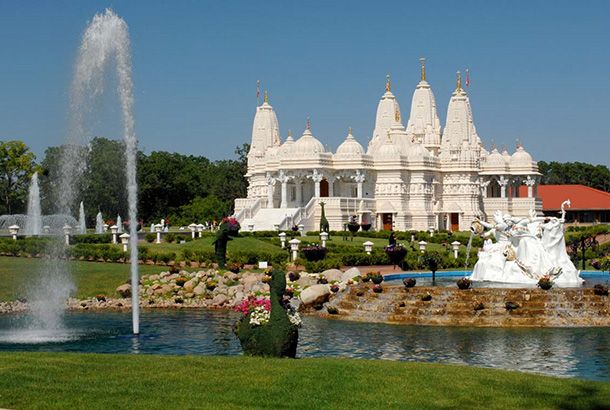Human trafficking suit spreads to Hindu temples in 5 locations, including Bartlett


By DAVID PORTER | Associated Press
A lawsuit in which workers accuse a Hindu organization of human trafficking by luring them from India to build a temple in New Jersey for as little as $1.20 a day has widened to four other states.
In the initial lawsuit filed in May, workers at a Hindu temple in Robbinsville, New Jersey, claimed leaders of the Hindu organization known as Bochasanwasi Akshar Purushottam Swaminarayan Sanstha, or BAPS, coerced them into signing employment agreements and forced them to work more than 12 hours per day with few days off, under the watch of security guards. They traveled to New Jersey under R-1 visas, which are meant for “those who minister, or work in religious vocations or occupations,” according to the lawsuit.
The amended lawsuit filed last month added several more workers to the lawsuit. The workers, who the lawsuit says were from marginalized communities in India, claim they were exploited at temples in Chino Hills, California, outside Los Angeles; Bartlett, Illinois, outside Chicago; Stafford, Texas, outside Houston; and Lilburn, Georgia, outside Atlanta.
“U.S. Government officials have authorized the use of R-1 visas for stone artisans for 20 years, and federal, state, and local government agencies have regularly visited and inspected all of the construction projects on which those artisans volunteered," Paul Fishman, an attorney representing BAPS, said in an email Wednesday.
The workers in other states allege that, while they weren't forced to work as many hours as their counterparts in New Jersey, they were paid well below standards set by federal and state minimum wage laws. Multiple workers named as plaintiffs worked at more than one of the temples, the lawsuit alleges, some for as long as eight or nine years in total.
Similar to the allegations in the initial suit against the Hindu temple in Robbinsville, outside the New Jersey capital of Trenton, workers at the temples in the other four states claim they weren't allowed to have their passports and slept in large halls on the temple grounds that were monitored by security guards.
“At the Robbinsville temple and elsewhere, the defendants intentionally caused the workers to reasonably believe that if they tried to leave their work and the temple compounds, they would suffer physical restraint and serious harm," the lawsuit claims.
The temples named in the lawsuit are all affiliated with BAPS, a corporation registered in Delaware and with offices in Piscataway, New Jersey.

